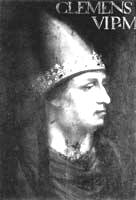|
|
 It
is said that Philip VI of France sent an envoy to Avignon to
secure the election of his favorite, Pierre Roger. The envoy
arrived to find that the cardinals had already elected a
pope--Pierre Roger. He took the name Clement VI. Pierre was born
in 1291 near Limoges of the noble family of the counts of
Beaufort. He entered the Benedictine monastery of La Chaise Dieu
at the age of ten. He studied at Paris and distinguished himself
as a theologian. Abbot, bishop, archbishop, and cardinal--his
career was brilliant. The king, like the ecclesiastical
authorities, appreciated Pierre's ability and made him
chancellor. It
is said that Philip VI of France sent an envoy to Avignon to
secure the election of his favorite, Pierre Roger. The envoy
arrived to find that the cardinals had already elected a
pope--Pierre Roger. He took the name Clement VI. Pierre was born
in 1291 near Limoges of the noble family of the counts of
Beaufort. He entered the Benedictine monastery of La Chaise Dieu
at the age of ten. He studied at Paris and distinguished himself
as a theologian. Abbot, bishop, archbishop, and cardinal--his
career was brilliant. The king, like the ecclesiastical
authorities, appreciated Pierre's ability and made him
chancellor.
Clement VI, like Benedict XII, had been a monk; but while
Benedict remained the austere religious bent upon reform, Clement developed into
a magnificent prince, scattering largesse with both hands. To Avignon flocked
swarms of fortune hunters and pleasure-seekers. The austere castle built by
Benedict was transformed into a princely palace. Abuses, pruned by Benedict,
flourished with renewed vitality. The extravagance of Clement hurt the financial
position of the papal court even as the sumptuous display lowered its prestige.
Not that Clement was a bad man (Petrarch's accusations seem unfounded) but his
court echoed to the music of the lute and the lively trumpets of the tournament.
In Clement's reign, Rome saw the meteoric rise and fall of Cola
de Rienzi. At first Clement allowed the Tribune to rule Rome, but when Rienzi
abandoned good sense, the Pope withdrew his support and Rienzi's regime
collapsed. Far from returning to Rome, Clement dug the papacy in deeper at
Avignon by purchasing the territory from Joanna, queen of Naples and countess of
Provence. He did agree to the Romans' request that the Holy Year should be
celebrated every fiftieth year.
Clement tried to stop the disastrous war between France and
England. He succeeded only in arranging a truce. Indeed, his partiality for
France (he lent large sums to Philip) led to the Statute of Provisors which
limited papal financial exactions in England.
Clement did what he could to promote a league against the Turks.
The league enjoyed limited success by clearing Turkish pirates from the
Archipelago. He also tried to bring back Greeks and Armenians to Catholic unity.
When the Black Death hit Europe, Clement proved that under his
rich robes beat the heart of a true vicar of Christ. The dreadful scourge
desolated France in 1348. Avignon was hit hard, but the Pope stayed at his post.
He took spiritual and temporal measures to check the plague and bolster morale.
The stunning blow had numbed men's wits and soon the cry arose that the Jews had
poisoned the wells. In German cities mobs rose against the poor Jews. Clement
spread the papal mantle around this persecuted folk. He excommunicated those who
attacked them and opened the Papal States to Jewish refugees.
Clement VI died rather suddenly on December 6, 1352. St. Brigit
of Sweden, the famous mystic, had spoken severely of the Pope, but she believed
that by his charity he would be saved.
Excerpted from "Popes Through the Ages" by
Joseph Brusher, S.J.
  
|

